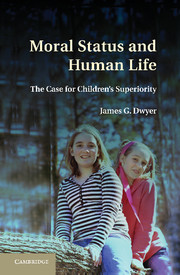Book contents
- Frontmatter
- Contents
- Introduction
- 1 What Is Moral Status and Why Does It Matter?
- 2 How Is Moral Status Determined?
- 3 Selecting Criteria of Moral Status
- 4 Problems in Applying a Multicriteria Approach
- 5 Applying a Multicriteria Moral Status Test to Adults and Children
- 6 Legal, Policy, and Moral Implications of Children's Superiority
- Conclusion
- Bibliography
- Index
Introduction
Published online by Cambridge University Press: 10 November 2010
- Frontmatter
- Contents
- Introduction
- 1 What Is Moral Status and Why Does It Matter?
- 2 How Is Moral Status Determined?
- 3 Selecting Criteria of Moral Status
- 4 Problems in Applying a Multicriteria Approach
- 5 Applying a Multicriteria Moral Status Test to Adults and Children
- 6 Legal, Policy, and Moral Implications of Children's Superiority
- Conclusion
- Bibliography
- Index
Summary
Historically, children have occupied an inferior social status, in the sense that adults – who dictate the norms of social interaction – have generally regarded children as less worthy of consideration than themselves. A paradigmatic example of this phenomenon is the ancient Roman law under which parents had legal power to sell or kill their offspring (Maine 1930, 153). In addition to having an inferior social status, children have historically been viewed, by many philosophers in the Western intellectual tradition, as occupying an inferior moral status. Especially in the post-Enlightenment Western world, when the rational capacities of the individual were central to political theories supporting liberation from monarchy, philosophers maintained or presupposed that only rational, autonomous beings are “persons” belonging to the moral community, a proposition that could explain and justify children's inferior social status. The prevailing view of childhood was as mere preparation for adulthood, a state of being unfinished relative to the human telos of cognitive and physical maturity.
However, beginning in the seventeenth century, and accelerating greatly in recent decades, children's position in Western society and in political and moral philosophy has been substantially elevated. Today, international and domestic children's rights documents, national ombudsmen for children in many countries, professionalized child welfare agencies, public debates over the acceptability of corporal punishment, and a culture of more child-centered parenting testify to the enhanced respect for children in society.
- Type
- Chapter
- Information
- Moral Status and Human LifeThe Case for Children's Superiority, pp. 1 - 8Publisher: Cambridge University PressPrint publication year: 2010



